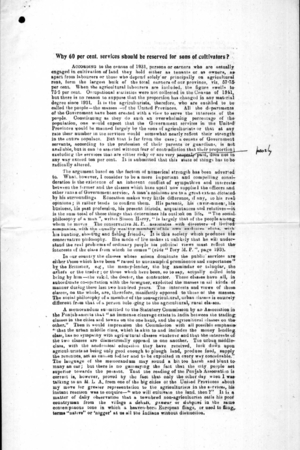In this document dated March 21, 1947, Charan Singh argues for reserving 60% of government services in the United Provinces (now Uttar Pradesh) for sons of cultivators. Singh presents several key arguments to support this proposal, emphasizing the need for better representation of the agriculturalists in government services.
Singh begins by highlighting the demographic imbalance, noting that cultivators form more than half of the population but are severely underrepresented in government services, with their share estimated at around 10%. He argues that this disparity needs to be addressed to ensure fair representation. A central argument in Singh's proposal is the inherent conflict of interests between farmers and urban, non-agricultural classes who dominate government services. He contends that officers from non-agricultural backgrounds often lack understanding of rural issues and farmers' needs. Singh believes that officers with rural backgrounds are better equipped to understand and address the problems of the agricultural majority, as they can relate to villagers' psychology and appreciate their needs more effectively.
Singh also emphasizes the character and efficiency aspects of his proposal. He argues that sons of farmers, raised in rural environments, possess qualities like patience, perseverance, and robustness that make them potentially more efficient and less corrupt administrators. He believes these traits, developed through the challenges of agricultural life, are valuable assets in public service.
In conclusion, Singh emphasizes the need of such reservation to create a more representative and effective government administration.
Notably, he did not advocate for reservations based on caste distinctions. The primary objective of his proposed system was to establish an administrative structure that would be responsive to the economic interests of rural communities, rather than catering to a select few dominant castes. At this juncture in his life, having reached the age of 45, his ideas were well-developed, grounded in critical economic and social analysis.
In his pursuit of equitable representation, Singh advocated for a class-based system rather than one founded on caste or religious distinctions. He conceptualized a framework centred on the shared economic interests of all agricultural castes, a demographic that would later be categorized as OBCs (Other Backward Classes). Furthermore, he proposed an additional 25% reservation for landless labourers.
This nuanced approach to representation and governance effectively refutes criticisms that label him as a proponent of casteism. His vision for a more inclusive and economically-driven system of representation demonstrates a progressive stance that transcended traditional caste-based paradigms.


